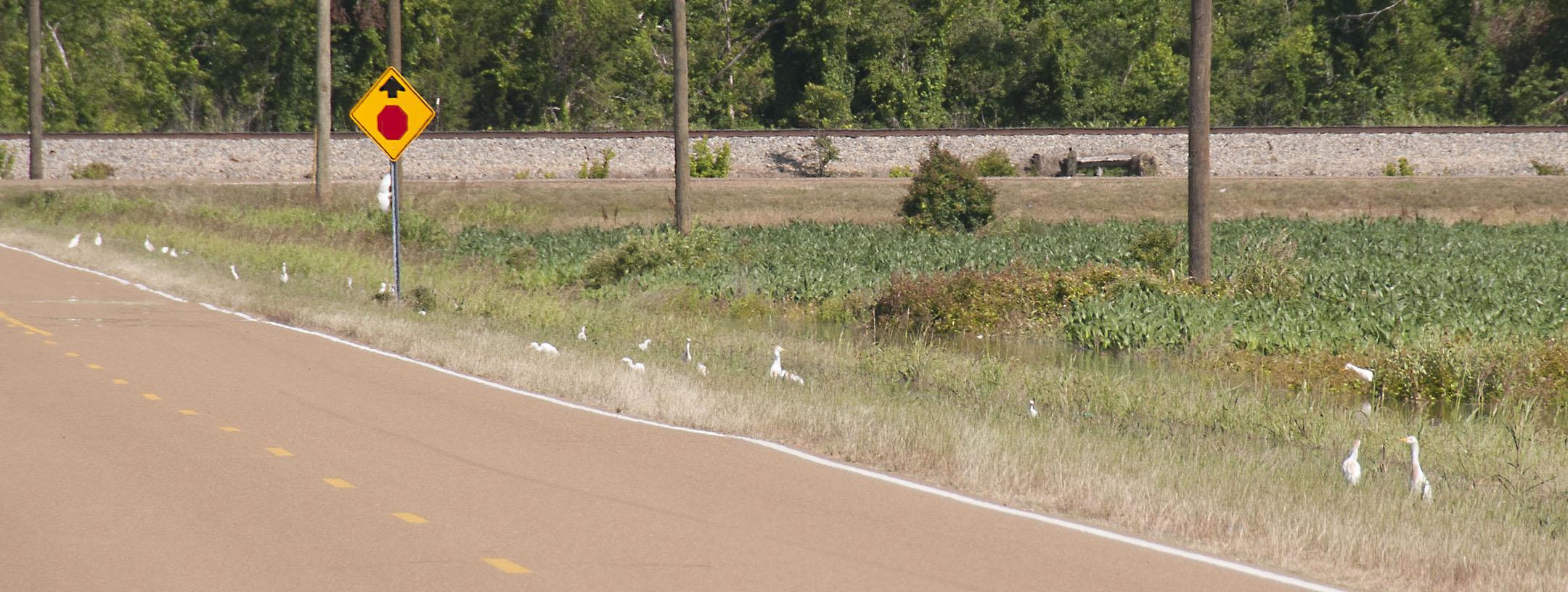Information Possibly Outdated
The information presented on this page was originally released on May 19, 2011. It may not be outdated, but please search our site for more current information. If you plan to quote or reference this information in a publication, please check with the Extension specialist or author before proceeding.
Animals fleeing floods cause people problems
MISSISSIPPI STATE – Flooding from the Mississippi and other rivers is disrupting even the wildlife as it brings activities to nearly a standstill in many areas of the Delta.
The river flooding is already displacing wildlife, moving them to higher and drier areas, where they sometimes cause problems as they interact with humans. Deer, raccoons, opossums, snakes and ants are all often found in unexpected places during times of flooding.
Bronson Strickland, wildlife management specialist with the Mississippi State University Extension Service, said animals fleeing from trouble go to the first place that seems suitable.
“Sometimes the places they go for safety are ideal wildlife habitats, and other times they’re not,” Strickland said. “It’s important not to approach wildlife in these situations, as these displaced wild animals may become aggressive. Even when you’re trying to help them, they usually don’t recognize your good intentions, and you may make the situation worse for the animal and put yourself in danger.”
Strickland said when a wild animal is indoors or in another situation that has to be addressed, act passively if possible. Bring in a wildlife professional or law enforcement official for any animal that could be dangerous. An animal found indoors will often escape outdoors on its own if all exits are open and everyone moves away from the area.
Strickland said hunters harvest between 200,000 and 300,000 deer each year in Mississippi, barely making a dent in the state’s estimated deer population of 2 million. Those that live near humans are not as shy and skittish as those that live in more remote areas.
“Those that are not accustomed to human interaction will be scared for their lives. Treat them that way,” Strickland said.
Kris Godwin, state director for the U.S. Department of Agriculture in the Animal and Plant Health Inspection Services’ Wildlife Services, advised on possible situations involving wildlife that could develop because of Mississippi River flooding.
“Displaced wildlife, especially alligators and snakes, can cause human safety issues, especially in search and rescue situations,” Godwin said. “Residents returning to businesses and homes may find some of these animals within structures, and this will cause safety issues.”
Roadways are often higher than surrounding areas, and alligators and deer may flee to roads when flooding is nearby. Feral swine, a common problem around cropland, may be displaced from their usual areas and can damage levees by rooting on them.
“Professional wildlife personnel should be called in to address many search and rescue or recovery incidents related to wildlife, as these can be too unpredictable or dangerous to try to handle alone,” Godwin said.
Bruce Leopold, head of MSU’s Department of Wildlife, Fisheries and Aquaculture and co-director of The Berryman Institute, said some wild animals will find themselves isolated on islands surrounded by flood waters.
“In most cases, do not feed wildlife you find on your property. Feeding will offer an incentive for deer and other wildlife to remain on your property rather than moving along,” Leopold said. “The best course of action is to leave wildlife alone while they move through your property searching for available habitat on higher ground.”
Some animals are expected to die from the current flooding, but only time will tell how many. Leopold said the young and very old are most vulnerable, but animals have an innate sense of what to do in life-threatening situations, and many will survive.
Among the dangerous animals to watch for and avoid near flood situations are alligators, snakes, bears, fire ants and mosquitoes. Leopold said mosquito numbers typically explode when flood waters leave behind all kinds of containers filled with water. Mosquito bites can spread a variety of diseases, including West Nile Virus and other types of encephalitis.
Fire ants, while always a nuisance, can become more dangerous when flooded.
“Fire ants are flushed from their nests in large surges of water or flood situations,” Leopold said. “Once flushed, they form a raft by attaching to one another, and they are able to float on top of water. These large concentrations of ants can be aggressive and cause serious bites.”
Bill Hamrick, Extension associate in MSU’s Forest and Wildlife Research Center, said small mammals, such as mice and rats, can enter homes, nest and feed on available food sources. If infestations are large enough, they can pose a disease risk to humans.
“Fleas can be an issue if there are large infestations of mice and rats. Ticks aren’t a big problem,” Hamrick said.
MSU mobilized Hamrick to help with wildlife issues in the flooded areas of the state. His efforts are being supported financially by the Berryman Institute and Delta Wildlife, as the correct handling of wildlife issues is important to the state. Other Extension agents are on-call and handling wildlife and other flood-related issues in Mississippi.










